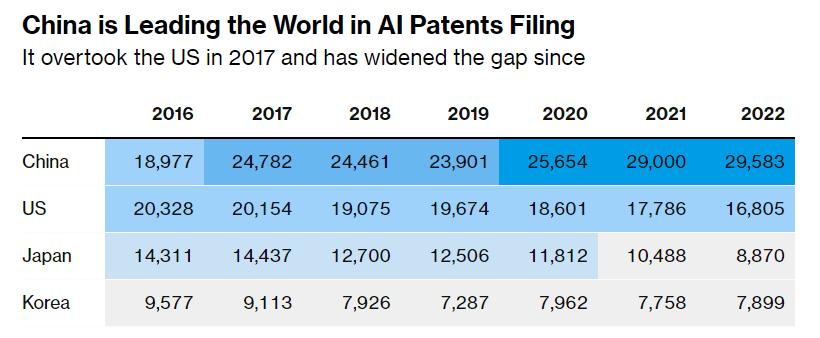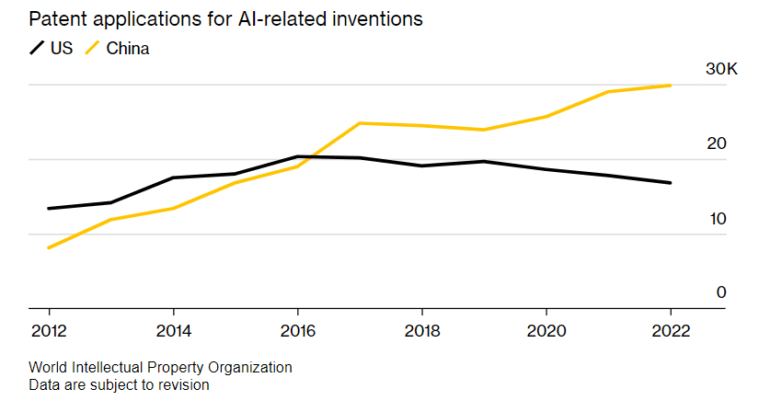TL;DR:
- China surpassed the US in AI patent filings in 2022, with 29,853 patents, compared to a decline in US filings.
- China now accounts for over 40% of global AI patent applications, with Japan and South Korea also contributing significantly.
- Beijing’s push for dominance extends to areas like chipmaking, space exploration, and military sciences.
- President Xi Jinping’s directive accelerates Chinese investments in AI and quantum computing.
- Baidu competes with giants like Alibaba and Tencent to develop a local answer to the US AI chatbot ChatGPT.
- Accumulating patents is seen as a strategic response to US restrictions; Chinese firms, including Huawei, have a history of innovation.
- China overtook the US in AI patents in 2017, signaling a trend of rapid integration of AI into various industries.
Main AI News:
In the fast-paced realm of artificial intelligence, China continues to solidify its position as a global frontrunner, leaving the United States trailing behind. The Asian giant’s unwavering commitment to shaping and steering the future of this transformative technology is becoming increasingly evident, and the implications for the world’s most prosperous economies are profound.
According to data from the World Intellectual Property Organization, Chinese entities filed a staggering 29,853 AI-related patents in the year 2022, marking a significant increase from the previous year’s 29,000 filings. In contrast, the United States witnessed a 5.5% decline in AI patent submissions. Astonishingly, China’s share accounted for nearly 80% more AI patents than those filed in the United States, solidifying its status as the global leader in AI innovation. The data, sourced from a United Nations-affiliated agency, also reveals that Japan and South Korea made significant contributions to the AI patent landscape, with a combined total of 16,700 applications in 2022.
These statistics underscore China’s relentless drive to propel its companies and institutions ahead in crucial sectors such as chip manufacturing, space exploration, and military sciences. Recent directives from President Xi Jinping have urged the nation to accelerate fundamental research efforts in response to US endeavors aimed at restricting China’s access to cutting-edge technologies. Consequently, this has led to a surge in investments by Chinese corporations in fields like artificial intelligence and quantum computing.
Baidu Inc. has emerged as a formidable contender, fiercely competing with industry giants like Alibaba Group Holding Ltd. and Tencent Holdings Ltd., along with startups such as Baichuan and Zhipu. Their aim? To develop a homegrown counterpart to the pioneering generative AI chatbot, ChatGPT, produced by US-based OpenAI.
China’s Unassailable Leadership in AI Patent Filings: Widening the Gap Since 2017
The supremacy shift occurred in 2017 and has continued to expand ever since.
Notably, scholars closely aligned with Beijing’s decision-makers argue that accumulating a robust portfolio of patents represents one of the most potent countermeasures against Washington’s campaign of restrictions. While not every patent application translates into tangible innovations, Chinese enterprises like Huawei Technologies Co. have a track record of spearheading innovation in critical sectors, including networking, supercomputing, and image recognition.
China first surpassed the United States in AI patent filings back in 2017, marking the onset of a trend where local companies rapidly integrated algorithms into a wide spectrum of industries, ranging from ride-hailing services to e-commerce platforms.

Source: WIPO
Conclusion:
China’s continued dominance in AI patents highlights its commitment to shaping the future of AI technology. This trend signifies that China is not only catching up with but surpassing the United States in key innovation sectors. It also suggests that Chinese companies will play a vital role in defining the global AI market and could pose significant competition to established US tech giants.

